最新初中人教版英语八年级上册Unit 7语法小结
人教版英语八年级上册Unit7全单元 重点概念总结
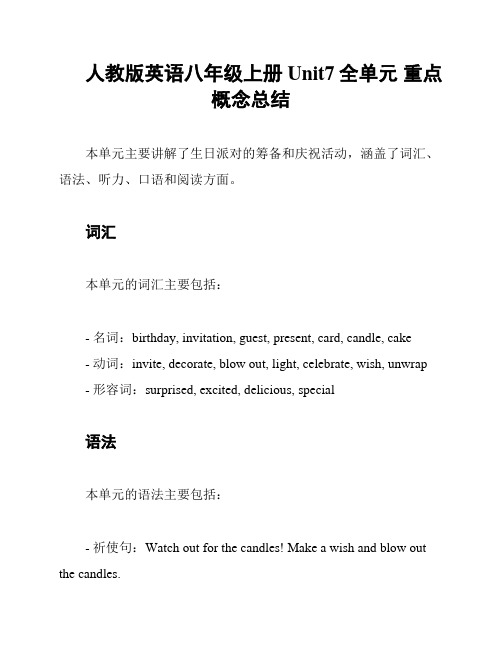
人教版英语八年级上册Unit7全单元重点概念总结本单元主要讲解了生日派对的筹备和庆祝活动,涵盖了词汇、语法、听力、口语和阅读方面。
词汇本单元的词汇主要包括:- 名词:birthday, invitation, guest, present, card, candle, cake- 动词:invite, decorate, blow out, light, celebrate, wish, unwrap - 形容词:surprised, excited, delicious, special语法本单元的语法主要包括:- 祈使句:Watch out for the candles! Make a wish and blow out the candles.- 含有并列连词的复合句:I love birthday parties, but I can't have one this year because I'm sick.- 特殊疑问句:What are you going to be for Halloween? Who are you inviting to your birthday party?听力本单元的听力主要涉及到生日派对上的对话和相关信息,如生日礼物、派对食物和玩具等。
通过听力练,可以提高听取英语语言信息的能力。
口语本单元的口语练主要包括:- 描述生日派对上的场景- 叙述收到的生日礼物- 邀请他人参加派对- 给他人送上生日祝福阅读本单元的阅读材料主要涉及两篇文化背景相关的短文和一篇与生日相关的短文,通过阅读可以了解不同国家的生日庆祝方式和文化背景知识。
以上是本单元的重点概念总结,希望能对各位同学的英语学习有所帮助。
人教版八年级上册英语Unit7知识点梳理及语法讲义(学生版)

八年级上册英语Unit 7知识点与语法精讲精练词汇梳理(一)完成单词梳理:名词:1. 纸;纸张 2. 污染;污染物 3. 语言;预测4. 将来;未来5. 环境6. 行星7. 地球;世界8. 部分9. 和平10. 海;海洋11. 天空12. 宇航员;航天员13. 公寓套房14. 火箭15. 太空;空间16. 仆人17. 单词;词18. 工厂19. 形状;外形20. 一方(的意见、态度、立场)21. 假期;假日动词:1. 污染 2. 建筑;建造 3. 相信;认为有可能4. 不同意;持不同意见;有分歧5. 同意;赞成;应允副词:1. 已经;早已 2. 甚至;连;愈加 3. 很可能;大概介词:1. 在……期间形容词:1. 有危险的;不安全的 2. 可能存在或发生的;可能的3. 不可能存在或发生的;不可能的兼类词:1. (v)种植(n)植物 2. (adj)人的(n)人3. (v/n)倒塌;跌倒(n)(美式)秋天4. (adj/prep)在……里面(二) 词汇变形小结:1. pollute (v. 污染) — (n. 污染)2. peace (n. 和平) — (adj. 和平的)3. build (v. 建筑) — (n. 建筑物)4. dangerous (adj. 危险的) — (n. 危险)5. Japan (n. 日本) — (adj/n. 日本的;日本人)6. agree (v. 同意) — (反义词:不同意)7. fall(v. 倒塌;跌倒;掉落— (过去式)8. possible(adj. 可能的) — (反义词:不可能的)9. probable(adj. 可能的) — (adv. 很可能)10.prediction(n. 预测) — (v. 预测)【练一练】用所给词的适当形式填空1.I'm sorry that I____________(agree) with you,because your idea is too old.2.We should take action to protect animals in ____________(dangerous).3.It seems ____________ (possible) that people can fly.4.The ____________ ( pollute) in the city is being more and more serious.5.There are many ____________ (planet), such as Venus, the Earth and Mars.6.There will be more tall____________(build) in the city next year.7.This is my ____________ (predict) about my future.8.Could you please give me some____________(paper)? I want to write an article.9.Now there are already robots working in these ____________ (factory).10.He does the same thing everyday.It____________(sound) boring.(三) 短语攻关:参与;发挥作用太空站;宇宙空间站多次;反复地许多;大量突然倒下;跌倒寻找;寻求在电脑上;通过电脑在地球上在将来和……一样度假活到200岁一百年后处于极大的危险中淡水醒来;叫醒知识点梳理1.Books will only be on puters, not on paper. 书将只会在电脑上出现,而不会以纸质形式出现。
八年级上册人教版英语unit7知识点
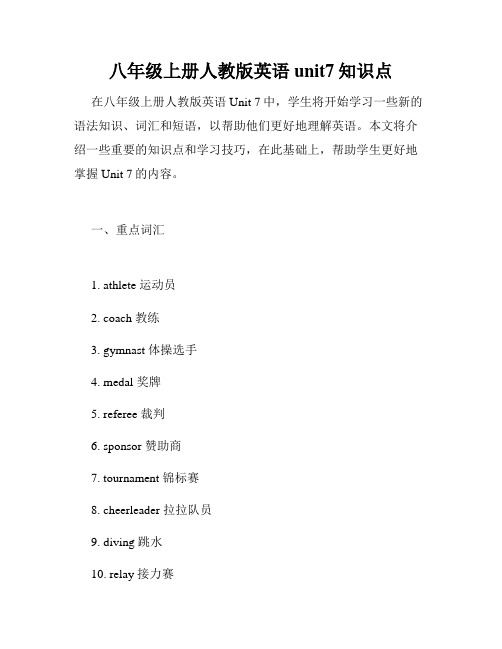
八年级上册人教版英语unit7知识点在八年级上册人教版英语Unit 7中,学生将开始学习一些新的语法知识、词汇和短语,以帮助他们更好地理解英语。
本文将介绍一些重要的知识点和学习技巧,在此基础上,帮助学生更好地掌握Unit 7的内容。
一、重点词汇1. athlete 运动员2. coach 教练3. gymnast 体操选手4. medal 奖牌5. referee 裁判6. sponsor 赞助商7. tournament 锦标赛8. cheerleader 拉拉队员9. diving 跳水10. relay 接力赛二、语法知识1. 一般现在时:用于描述现在的事情和状态。
例句:I usually get up at six o'clock in the morning.2. 现在进行时:用于描述正在发生的动作。
例句:He is playing basketball with his friends now.3. 形容词比较级和最高级:用于比较两个或多个事物的程度。
例句:Lucy is taller than Lily, but Lily is the smartest in their class.4. 一般过去时:用于描述过去的事情。
例句:I watched a movie last night.三、学习技巧1. 听力:在听力练习中,学生应该注重听懂内容的基础上,提高对语音和语调的敏感度。
2. 语法:学生应该注重掌握英语基础语法,例如名词、动词、形容词等,以便正确表达自己的意思。
3. 阅读:学生应该多读英语文章,尤其是关于运动员和体育赛事的文章。
通过阅读可以了解相关的词汇和表达方式。
4. 口语:通过模仿、反复练习,学生可以提高口语表达能力。
可以利用录音设备进行自我评估。
在学习八年级上册人教版英语Unit 7时,学生需要注重对语法知识的掌握,同时注意抓住重点词汇和短语,通过多种学习技巧提高自己的语言能力。
人教版八年级上册英语 Unit 7单元知识点总结

Unit 7 Will people have robots?知识点1. Do you think…?你认为……?后常接宾语从句,宾语从句要用陈述句的语序。
例:Do you think there will be more pollution in the future?宾语从句特殊疑问词+ do you think+陈述语序2. paper纸不可数名词一张纸a piece of paper报纸,论文,试卷可数名词3. live to be + 年龄= live to +年龄= live the age of + 年龄活到多少岁live to do sth. 为做某事而活着。
后面的不定式表目的。
live v. 第三人称单数lives /liviz/;life n. 复数形式lives /laivz/living adj. 活着的作定语和表语alive adj. 活着的只作表语例:a living man (定语) The man is living (表语,放在 be 动词后面) The man is alive (表语)4. in 100 years 在 100 年以后in + 一段时间在……之后一般将来时,对其提问用 how soon (多久)take part in = join in 参加play a part in sth./ doing sth. 参与到……中去;在……中扮演着……的角色6. human n. 人复数(pl.) humansadj. human being =humanperson 个体的人,有单复数形式,“一个人”只能说“a person”,不能说“a people”。
people 人,人们集体,为一个集合名词;也可作“民族”,此时有单复数,a people 指“一个民族”,所以它的复数就是“peoples”。
7. such adj. 这样的such+ a/an+ adj. + 单数可数名词such + adj. + 复数可数名词/不可数名词so adj. so + adj./ adv. + 复数名词/不可数名词so + adj. + a/an + 单数可数名词such + a/an + adj. + 单数可数名词= so + adj. + a/an + 单数可数名词8. It is + adj. + for sb. to do sth. 做某事对某人而言是……此句型中的“it”为形式主语,真正的主语为不定式短语比较 It is + adj. + for sb. to do sth.与 It is + adj. + of sb. to do sth.(这里的形容词是描述事物性质的 ) (这里的形容词是表示人的性格特征或品质,如clever,kind, nice, good,foolish 等)It is + adj. + for sb. to do sth. 句式还可以与动名词作主语的句式相互替换。
Unit7单元知识点归纳人教版八年级英语上册

人教版英语八年级上册第七单元语法与知识点归纳(跟随课本)Unit 7 Will people have robots ?一、短语突破:1、there will be将会有2、in people's homes在人们的家里3、study at home on computers在家里的电脑上学习4、be free免费5、free time空余时间6、more pollution更多的污染7、use the subway使用地铁8、be like 像9、be in great danger处于极大危险中10、move to+地点名词搬到某地11、leave on the earth住在地球上12、plant trees种树13、play a part in…在某方面起作用14、save the earth 拯救地球15、In 100 years 100年以后16、use money用钱17、World peace世界和平18、hope so希望如此19、in the future在未来20、fresh water淡水21、in the cities在城里22、the same as…与什么一样23、in the country在农村24、see sth.看见某物25、spend time together 花时间在一起26、space station太空站27、live in an apartment住在一个公寓28、across from…在…对面29、near here在这附近30、fly rockets to the moon乘火箭到月球31、in movies在影片中32、one’s own某人自己的33、help with the housework帮忙做家务34、dangerous places危险的地方35、help sb.( to做某事36、over and over again一次又一次37、get bored感到厌烦38、try to do sth. 尽力做某事39、look like看起来像40、for example例如41、be able to能够42、wake up醒来43、disagree with sb. 不同意某人44、in 25 to 50 years 在25到50年以后45、hundreds of years数百年46、many different shapes 许多不同的形状47、fall down 倒下48、look for寻找49、under the buildings在建筑物的下面50、a newspaper reporter一个新闻者51、live in+地点名词在某地居住52、in that city在那个城市53、as a reporter作为一名记者54、have a pet 养宠物55、keep a bird养一只鸟儿56、During the week在一个周期间57、wear smart clothes穿舒适的衣服58、on the weekend在周末=on weekends 59、take a holiday去度假60、one day有一天61、free time activities空余时间活动62、in the neighborhood在附近地区63、the meaning of……的意思64、no one knows没有人知道65、fly up into the sky飞向天空66、study harder学习更努力67、both… and…两者都68、be scared害怕二、容易混淆的知识点、短语等突破。
人教版八年级上册英语 知识点语法归纳总结 Unit 7
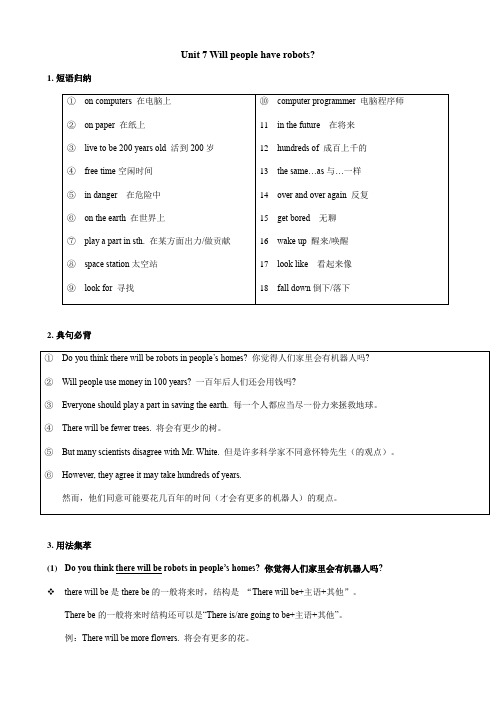
Unit 7 Will people have robots?1.短语归纳2.典句必背3.用法集萃(1)Do you think there will be robots in people’s homes? 你觉得人们家里会有机器人吗?❖there will be是there be的一般将来时,结构是“There will be+主语+其他”。
There be的一般将来时结构还可以是“There is/are going to be+主语+其他”。
例:There will be more flowers. 将会有更多的花。
There is going to be a basketball match this afternoon. 今天下午会有一场篮球比赛。
❖ There will be 的句式变化有:(2) Will people use money in 100 years? 一百年后人们还会用钱吗? ❖ in 100 years 意为“在一百年之后”。
“in+一段时间”表示“在...(时间)之后”,常用于一般将来时的句子中, 提问“in+表示一段时间的词”时用how soon 或when。
例:—How soon/ When will they return? 他们过多久/什么时候返回?—In three weeks. 三周后。
My father will be back in a week. 我爸爸一周后回来。
❖ 拓展 ❖ 辨析:in, after, later(3) Everyone should play a part in saving the earth. 每一个人都应当尽一份力来拯救地球。
❖ play a part 意为“参与(某事)”,play a part in doing sth. 意为“参与做某事”。
❖ play a part in 还可以指“在...中起作用”,相当于play a role in 。
初中英语八上 Unit7语法知识点总结

Unit7Section ADo you think.....宾语从句及其做插入语的用法There be句型的一般现在时肯定否定回答以及反义疑问句的结构live to be+年龄=live to+年龄=live to the age of....活到...岁在....之后:in+一段时间(将来时);after+时间点(过去和将来时);段时间+later(过去和将来时)提问:how soon——in+段时间how long——for+段时间when——aftereverything 作主语V用单数;形容词修饰时形容词需要后置;与否定词连用表示部分否定。
free免费的有空的空闲的反义:busy原级比较级最高级many/much more mostlittle less leastfew fewer fewestfuture n. 将来未来in the future 在将来in future =from now on 从今以后,今后,往后enviromental 环境enviromental 环境的danger 危险in danger 在危险之中in great danger处于极度危险之中反义:out of danger 脱离危险on the earth 在地球上on earth 究竟me too=me,too=so do I 我也是play a part in 参与.....;在......中起作用;扮演.....角色+名词,代词或动名词做宾语。
I hope so我也希望如此I hope not 我希望不是这样Section BAcross prep./adv. 穿过,横穿,在什么对面(从一边横穿到另外一边)Across from 在....对面= on the other side ofThe shoe store is across from the bank.Walk/go/run/swim 等+across =cross ,与street,bridge,river等连用。
最全面人教版八年级上册英语第七单元知识点归纳总结
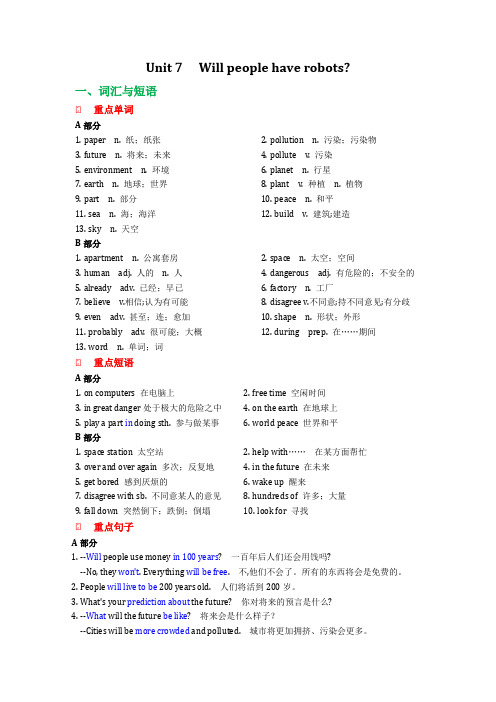
Unit 7 Will people have robots?一、词汇与短语● 重点单词A部分1.paper n. 纸;纸张2.pollution n. 污染;污染物3.future n. 将来;未来4.pollute v. 污染5.environment n. 环境6.planet n. 行星7.earth n. 地球;世界8.plant v. 种植n. 植物9.part n. 部分10.peace n. 和平11.sea n. 海;海洋12.build v. 建筑;建造13.sky n. 天空B部分1.apartment n. 公寓套房2.space n. 太空;空间3.human adj. 人的n. 人4.dangerous adj. 有危险的;不安全的5.already adv. 已经;早已6.factory n. 工厂7.believe v.相信;认为有可能8.disagree v.不同意;持不同意见;有分歧9.even adv. 甚至;连;愈加10.shape n. 形状;外形11.probably adv. 很可能;大概12.during prep. 在……期间13.word n. 单词;词● 重点短语A部分1.on computers 在电脑上2.free time 空闲时间3.in great danger处于极大的危险之中4.on the earth 在地球上5.play a part in doing sth. 参与做某事6.world peace 世界和平B部分1.space station 太空站2.help with……在某方面帮忙3.over and over again 多次;反复地4.in the future 在未来5.get bored 感到厌烦的6.wake up 醒来7.disagree with sb. 不同意某人的意见8.hundreds of 许多;大量9.fall down 突然倒下;跌倒;倒塌10.look for 寻找● 重点句子A部分1.--Will people use money in 100 years? 一百年后人们还会用饯吗?--No, they won't. Everything will be free. 不,他们不会了。
人教版初二英语上册第七单元重点语法
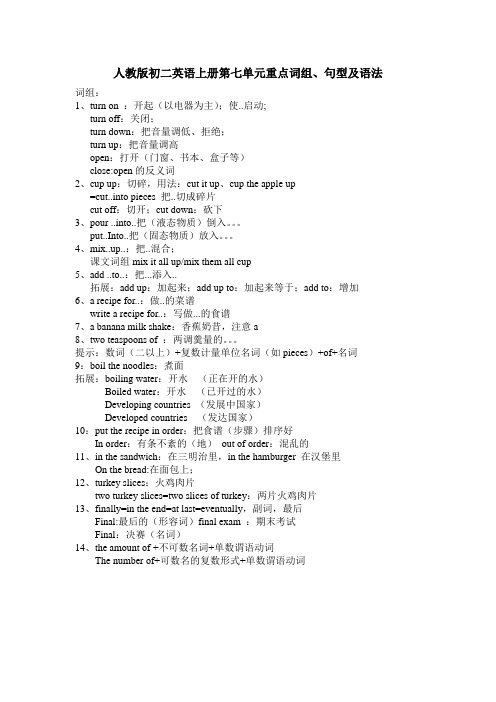
人教版初二英语上册第七单元重点词组、句型及语法词组:1、turn on :开起(以电器为主);使..启动;turn off:关闭;turn down:把音量调低、拒绝;turn up:把音量调高open:打开(门窗、书本、盒子等)close:open的反义词2、cup up:切碎,用法:cut it up、cup the apple up=cut..into pieces 把..切成碎片cut off:切开;cut down:砍下3、pour ..into..把(液态物质)倒入。
put..Into..把(固态物质)放入。
4、mix..up..:把..混合;课文词组mix it all up/mix them all cup5、add ..to..:把...添入..拓展:add up:加起来;add up to:加起来等于;add to:增加6、a recipe for..:做..的菜谱write a recipe for..:写做...的食谱7、a banana milk shake:香蕉奶昔,注意a8、two teaspoons of :两调羹量的。
提示:数词(二以上)+复数计量单位名词(如pieces)+of+名词9:boil the noodles:煮面拓展:boiling water:开水(正在开的水)Boiled water:开水(已开过的水)Developing countries (发展中国家)Developed countries (发达国家)10:put the recipe in order:把食谱(步骤)排序好In order:有条不紊的(地)out of order:混乱的11、in the sandwich:在三明治里,in the hamburger 在汉堡里On the bread:在面包上;12、turkey slices:火鸡肉片two turkey slices=two slices of turkey:两片火鸡肉片13、finally=in the end=at last=eventually,副词,最后Final:最后的(形容词)final exam :期末考试Final:决赛(名词)14、the amount of +不可数名词+单数谓语动词The number of+可数名的复数形式+单数谓语动词重点句型及应用一、We need three teaspoons of honey to make milk shake。
Unit+7笔记 人教版英语八年级上册
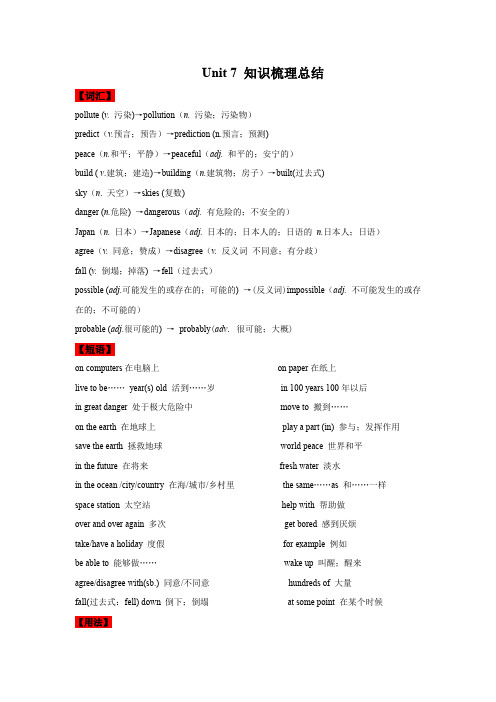
Unit 7 知识梳理总结【词汇】pollute (v.污染)→pollution(n. 污染;污染物)predict(v.预言;预告)→prediction (n.预言;预测)peace(n.和平;平静)→peaceful(adj.和平的;安宁的)build ( v.建筑;建造)→building(n.建筑物;房子)→built(过去式)sky(n. 天空)→skies (复数)danger (n.危险)→dangerous(adj. 有危险的;不安全的)Japan(n.日本)→Japanese(adj.日本的;日本人的;日语的n.日本人;日语)agree(v. 同意;赞成)→disagree(v. 反义词不同意;有分歧)fall (v. 倒塌;掉落)→fell(过去式)possible (adj.可能发生的或存在的;可能的)→(反义词)impossible(adj. 不可能发生的或存在的;不可能的)probable (adj.很可能的)→probably(adv. 很可能;大概)【短语】on computers在电脑上on paper在纸上live to be……year(s) old 活到……岁in 100 years 100年以后in great danger 处于极大危险中move to 搬到……on the earth 在地球上play a part (in) 参与;发挥作用save the earth 拯救地球world peace 世界和平in the future 在将来fresh water 淡水in the ocean /city/country 在海/城市/乡村里the same……as 和……一样space station 太空站help with 帮助做over and over again 多次get bored 感到厌烦take/have a holiday 度假for example 例如be able to 能够做……wake up 叫醒;醒来agree/disagree with(sb.) 同意/不同意hundreds of 大量fall(过去式:fell) down 倒下;倒塌at some point 在某个时候【用法】1.will+动词原形. 将要……2.there will be+主语+(其他). 将会有……3.more+可数名词复数/不可数名词. 更多的……4.less+不可数名词更少的……5.fewer+可数名词复数更少的……6.What will……be like? ……将会是什么样子7.play a part in(doing)sth. = play a role in(doing)sth. 在……中发挥作用8.There be sb./sth. doing sth. 有某人/某物正在做某事9.make sb. do sth. 让某人做某事10.It will be+adj.+to do sth. 做某事将会是……的【Language points】1.there will be……将有……;会有……是there be 句型的一般将来时,可以与there is/are going to be……进行句式转换There will be a film this evening. = There is going to be a film this evening.今晚将有一场电影。
人教版八上英语unit7知识点归纳

unit7 知识点归纳语法: 一般将来时含义: 表示将来某个时间要发生的动作或存在的状态,也表示将来经常或反复发生的动作,常与表示将来的时间状语连用。
构成: 主语+will+动词原形时间状语(标志词): tomorrow,next, in the future, in+段时间eg: We will come to see you next week.There will be less fresh water in the future.一般疑问句: 将will提前eg: Will you come to see me next week?Will there be a lot of fresh water in the future?否定句: 在will后加noteg: We won't come to see you next week.There won't be less fresh water in the future.注: 1.在疑问句中主语为第一人称I和we时,常用助动词shall eg: When shall we have the party?2. There be句型的将来时: There will be...eg: There will be a football game in our school next week.知识点:1. paper不可数名词 a piece of paper 一张纸2. pollution 不可数名词less pollution 更少的污染3. predict v. prediction n. 预言, 预测4. in the future 在将来5. pollute v. pollution n. 污染6. on the earth 在地球上on earth 究竟7. plant v. 种植n. 植物eg: We should plant more trees.There are a lot of plants in my garden.8. play a part in... 在某方面起作用9. peace n. 和平peaceful adj. 和平的eg: We all like peace.They live in a peaceful country.10. build v. 建筑building n. 建筑物eg: I want to build a beautiful building.11. space station 太空站12. human n. 人, 人类humans (pl.) 复数形式13. danger n. 危险dangerous 危险的14. Japan 日本Japanese 日本人, 日语,日本人的15. believe 相信believe in 信任16. agree with 同意disagree with 不同意eg: I agree with you. I disagree with you.=I don't agree with you.17. hundred 与数字连用不加s;与of连用必加s。
unit7八年级上册英语知识点总结
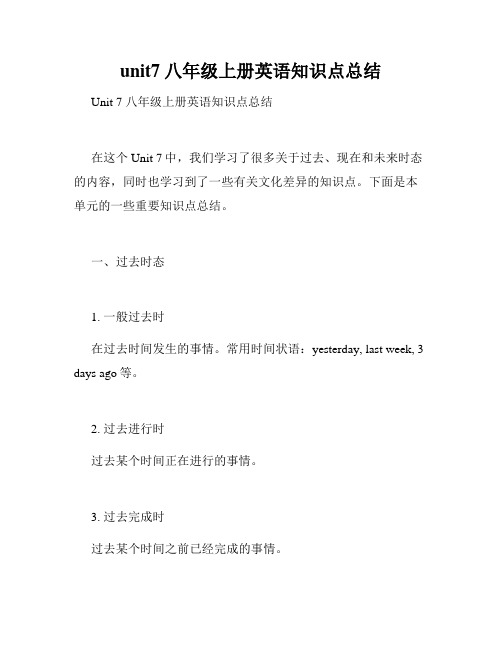
unit7八年级上册英语知识点总结Unit 7 八年级上册英语知识点总结在这个Unit 7中,我们学习了很多关于过去、现在和未来时态的内容,同时也学习到了一些有关文化差异的知识点。
下面是本单元的一些重要知识点总结。
一、过去时态1. 一般过去时在过去时间发生的事情。
常用时间状语:yesterday, last week, 3 days ago等。
2. 过去进行时过去某个时间正在进行的事情。
3. 过去完成时过去某个时间之前已经完成的事情。
4. 过去完成进行时过去某个时间之前一直在进行的事情。
二、现在时态1. 一般现在时目前经常会发生的事情。
2. 现在进行时正在发生的事情。
3. 现在完成时目前已完成的事情。
4. 现在完成进行时一直在进行中的事情到目前为止完成了。
三、未来时态1. 一般将来时将要发生的事情。
2. 将来进行时将来某个时间正在进行的事情。
3. 将来完成时将来某个时间前完成的事情。
4. 将来完成进行时将来某个时间前一直在进行的事情。
四、文化差异在不同的文化中,人们对待朋友和家人的方式可能会有所不同。
例如:在西方国家,人们习惯在新年、感恩节、生日等特殊节日送礼物表现感激和爱意,而在亚洲国家,人们习惯送红包表达喜庆和祝福。
此外,在国际商务领域中,了解不同文化之间的差异也非常重要,这可以帮助人们更好地处理国际商务交往中的问题。
总之,通过学习本单元的内容,我们能够更好地掌握过去、现在和未来时态,同时也加深了对文化差异的了解。
最新人教版八年级英语上册Unit7语法小结与重点词组

语法小结1.定义:一般将来时表示在将来某个时间要发生的动作或存在的状态。
2.时间状语:some day, this evening, tomorrow, the day after tomorrow, in the future, next week, in 10 years, in 2020年等。
3.结构:肯定句:主语+will/shall+动词原形否定句:主语+will/shall+not+动词原形一般疑问句:will/shall+主语+动词原形?特殊疑问句:特殊疑问词+will/shall+主语+动词原形?4.一般将来时的其他表示法。
①用现在进行时表示将来(表示按计划,安排要发生的事)。
②用be going to表示将来(表示明确打算或确信会发生)③there be的将来时:there will be+主语+其他。
重点词汇1. 在人们的家里in people’s homes2.通过电脑on computers3.活到200岁live to be 200 years old4.有很大的危险be in great danger5.参加play a part6.在将来in the future7.乘火箭飞往fly rockets to8.在天空on a space station9.感到厌烦get bored10.例如for example11.一遍又一遍over and over again12.几百年hundreds of years13.看起来像look like14.醒来wake up15.倒塌fall down16.在上班时间during the week17.在周末on the weekend= on weekends18.有天one day19.单词的意义the meanin of words。
八年级上册英语人教版unit7知识点
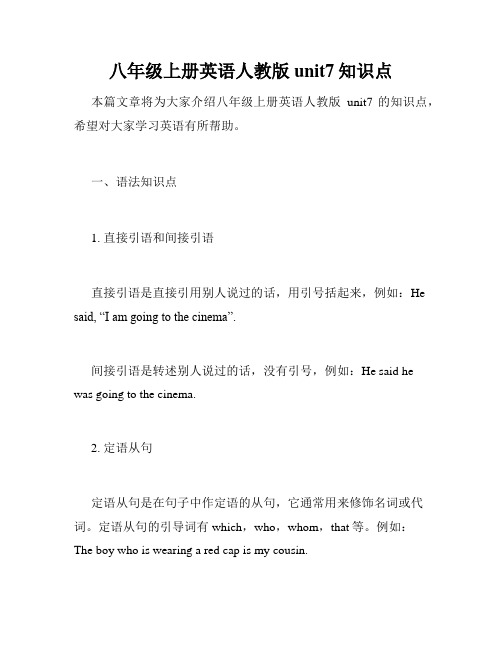
八年级上册英语人教版unit7知识点本篇文章将为大家介绍八年级上册英语人教版unit7的知识点,希望对大家学习英语有所帮助。
一、语法知识点1. 直接引语和间接引语直接引语是直接引用别人说过的话,用引号括起来,例如:He said, “I am going to the cinema”.间接引语是转述别人说过的话,没有引号,例如:He said he was going to the cinema.2. 定语从句定语从句是在句子中作定语的从句,它通常用来修饰名词或代词。
定语从句的引导词有which,who,whom,that等。
例如:The boy who is wearing a red cap is my cousin.3. 状语从句状语从句是在句子中作状语的从句,它通常用来表示时间,原因,条件,结果等。
状语从句的引导词有when,if,because,since,although等。
例如:If it rains tomorrow, we will stay at home.4. 名词性从句名词性从句是在句子中作名词的从句,它可以作主语,宾语,表语或补语。
名词性从句的引导词有that,whether,if,who,what等。
例如:What he said is true.二、词汇知识点1. 动词词组动词词组由动词加上介词或副词构成,例如:look after,put on,take off等。
2. 形容词词组形容词词组由形容词加上介词或副词构成,例如:happy with,interested in,famous for等。
3. 常用短语常用短语是日常生活中经常遇到的词组,例如:in order to,as soon as possible,be afraid of等。
三、听力技巧1. 注意听取关键词在听力时,应该注意听取关键词,例如时间,地点,人物等。
2. 不要死记硬背在听力时,不要死记硬背,应该听懂意思,理解句子。
Unit7知识点归纳人教版八年级英语上册

人教版八年级上册Unit 7 Will people haverobots?知识点归纳一、短语归纳1.study at home在家学习2.on puters 在电脑上e money 用钱4.be free 免费5.on paper 在纸上6.live to be...years old活到……岁7.free time空闲时间8.be in danger在危险中9.move to…搬到…10.on the earth 在世界上e less water 节约用水12.plant trees植树13.play a part in sth./doing sth. 在某方面出力/做贡献14.save the earth 拯救地球15.world peace世界和平16.in 100 years 100年后17.blue skies 蓝天18.in the future 未来19.space station太空站20.fly rockets to…乘火箭去…21.live on a space station 在太空飞船上生活22.do simple jobs 做简单的工作23. over and over again 反复24.get bored无聊25.look like看起来像26.make sb do sth 使某人做某事27.be able to do sth 能够做某事28. wake up 醒来/唤醒29.disagree with sb.不同意30.hundreds of 成百上千的31.fall down倒下/落下32.look for 寻找33.at some point 在某一方面34.which side 哪一方面35.agree with 同意36.fresh water淡水37.fly up into the sky 飞向天空38.be scared of sth 害怕某物39.be scared to do sth 害怕做某事二、重点句子1.Will people have robots?2.Do you think there will be robots in people’s homes?3.People will live to be 200 years old.4.There will be more people.5.There will be less free time.6.What’s your prediction about the future?7. I don’t think so.8.What will the future be like?9.Everyone should play a part in saving the earth.10.I sometimes see blue skies in my city.11.Scientists are now trying to make robots look likes humans and do the same things as we do.12.If bulidings fall down with people inside, these snake robots can help look for people under the buildings.13.Which side do you agree with?三、知识点归纳1.will +do 表示将来,同时也表示说话人主观愿意做的事,当主语是第一人称I/we时,也可以用shall.2.there be 将来时 there will bethere be going to be (第一个be就近原则)3.free 形容词有空的,available免费的4.more/less/fewer 区别more是many和much 的比较级,更多less 是little比较级,更少,修饰不可数fewer 是few的比较级,较少的,修饰可数名词5.crowd 名词拥挤形容词 crowded 拥挤的形容词反义词 uncrowded 不挤的6.a book about future 关于未来的书,about 关于=on7.danger 名词危险 be in great danger形容词 dangerous8.have to do不得不9.play a part in =play a role in doing sth 在某方面起作用10.spend 花费主语通常是人,spend 时间 in doing sth spend 时间 on sth过去式 spentpay 主语是人,pay forcost 主语是物take 主语是it it takes sb 时间 to do sth11.fly a rocket to the moon =fly rockets to thr moon12.there be sb doing sth 有人正在做某事13.bored 人感觉无聊,修饰人boring 东西无聊,修饰物14.make sb do sth 使某人做某事15.hundreds of 成百上千的,hundred 百,基数词修饰时,无论是几,都是单数。
八年级上册第七单元英语知识点总结
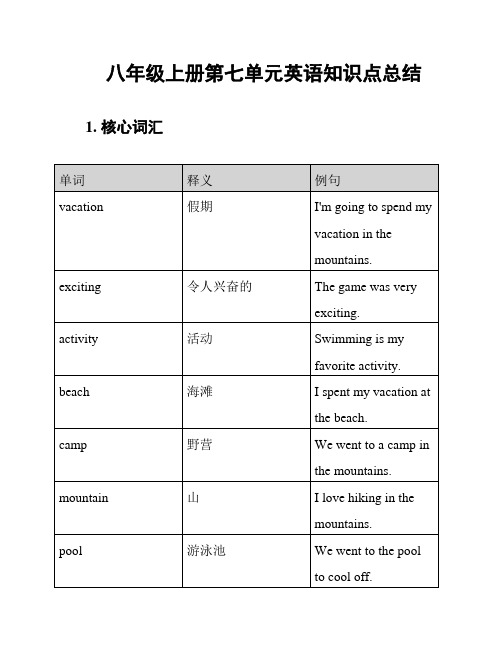
八年级上册第七单元英语知识点总结1. 核心词汇
2. 语法点
本单元主要介绍了现在进行时态的用法。
现在进行时态表示正在进行的动作或存在的状态。
构成形式为:主语 + be动词(am/is/are) + 动词ing形式 + 其他。
例句:
- I am reading a book.
- She is watching TV.
- They are playing basketball.
3. 功能句型
本单元学习了几个常用的功能句型,用于表达喜好和计划。
4. 文化背景
本单元主要介绍了美国的假期文化。
美国人有许多不同的假期,如感恩节、圣诞节、独立日等。
人们通常会在假期期间与家人、朋
友一起度过,参加各种活动,如野餐、烧烤、旅游等。
5. 练习建议
1. 熟记本单元的核心词汇,并学会运用它们造句。
2. 练习现在进行时态的用法,用这个时态造几个句子。
3. 学会使用本单元的功能句型,与同学或老师进行对话练习。
4. 了解美国的假期文化,尝试与中国的假期文化进行对比。
人教版八年级英语上册Unit7知识点归纳整理
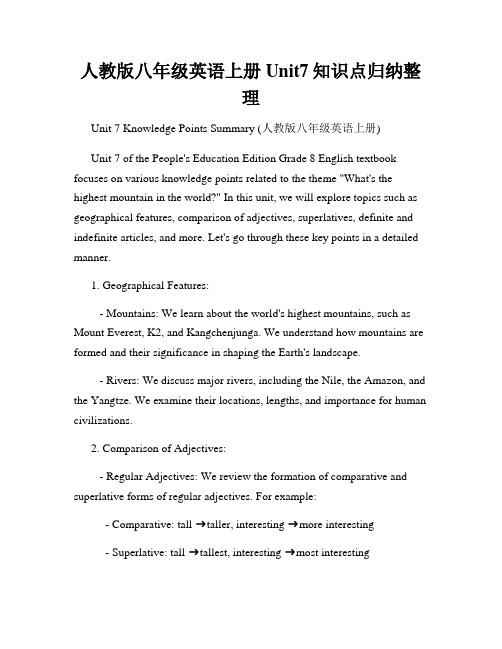
人教版八年级英语上册Unit7知识点归纳整理Unit 7 Knowledge Points Summary (人教版八年级英语上册)Unit 7 of the People's Education Edition Grade 8 English textbook focuses on various knowledge points related to the theme "What's the highest mountain in the world?" In this unit, we will explore topics such as geographical features, comparison of adjectives, superlatives, definite and indefinite articles, and more. Let's go through these key points in a detailed manner.1. Geographical Features:- Mountains: We learn about the world's highest mountains, such as Mount Everest, K2, and Kangchenjunga. We understand how mountains are formed and their significance in shaping the Earth's landscape.- Rivers: We discuss major rivers, including the Nile, the Amazon, and the Yangtze. We examine their locations, lengths, and importance for human civilizations.2. Comparison of Adjectives:- Regular Adjectives: We review the formation of comparative and superlative forms of regular adjectives. For example:- Comparative: tall ➜ taller, interesting ➜ more interesting- Superlative: tall ➜ tallest, interesting ➜ most interesting- Irregular Adjectives: We study the comparison of irregular adjectives, such as good, bad, little, many, etc. For example:- Comparative: good ➜ better, bad ➜ worse, little ➜ less, many ➜more- Superlative: good ➜ best, bad ➜ worst, little ➜ least, many ➜ most3. Superlatives:- Superlative Adjectives: We learn to use superlative adjectives to compare three or more things. For example:- Everest is the highest mountain.- The Amazon is the longest river.- Superlative Adverbs: We also explore the use of superlative adverbs. For example:- The goods were manufactured most efficiently in that factory.- She spoke most fluently among all the participants.4. Definite and Indefinite Articles:- Definite Article "the": We understand when and how to use "the" before nouns. For example, we use "the" when referring to specific objects, unique items, or things previously mentioned.- The Eiffel Tower is a famous landmark.- I lost the key that you gave me yesterday.- Indefinite Article "a/an": We learn when to use "a" or "an" before countable singular nouns. For example, "a" is used before consonant sounds, while "an" is used before vowel sounds.- She bought a book about space travel.- He is an honest person.5. Expressing Opinions:- We practice expressing personal opinions using adjectives, adverbs, and comparative/superlative forms. For example:- I think Mount Everest is the most fascinating mountain.- In my opinion, the Amazon River is the most important river in the world.6. Using Comparatives in Context:- We apply comparative forms in various contexts, such as discussing prices, distances, and abilities. For example:- This laptop is cheaper than that one.- London is further north than Rome.- She runs faster than her sister.These knowledge points provide a comprehensive understanding of Unit 7 in the People's Education Edition Grade 8 English textbook. By mastering these concepts, students will be equipped with the necessary language skills to describe geographical features, compare objects, and express opinions confidently. With further practice and application, they will enhance theiroverall English competence, enabling them to communicate effectively in various situations.。
八年级英语unit7知识点总结

八年级英语unit7知识点总结作为一个八年级学生,英语是我们学习生活中必不可少的一部分。
而在八年级英语的学习过程中,unit7无疑是其中的一大难点。
本文将总结八年级英语unit7的知识点,帮助同学们更好地掌握这个单元。
一、语法1. 现在完成时现在完成时是表示动作已经完成了的一种时态,通常使用“have/has + 过去分词”来构成句子。
例如:- I have finished my homework.(我已经完成了我的作业。
)- She has visited the Great Wall.(她已经参观了长城。
)- They have lived in Shanghai for 5 years.(他们已经在上海生活了5年。
)2. 定语从句定语从句用来修饰名词,通常使用关系代词who, whom, whose, which或that引导从句。
例如:- The girl who is standing over there is my sister.(那个站在那里的女孩是我的妹妹。
)- The book that I bought yesterday is very interesting.(我昨天买的那本书非常有趣。
)- The man whose car was stolen was very angry.(那个车被偷了的人非常生气。
)二、词汇1. 动词短语在unit7中,我们学习了一些英语中常见的动词短语,比如:- look after:照顾- take care of:照顾- make up:化妆- try on:试穿2. 常用短语在unit7中,我们还学习了一些英语中常用的短语,比如:- at the same time:同时- in the end:最终- be famous for:因……而出名- be interested in:对……感兴趣三、阅读理解在unit7中,我们学习了一些阅读理解技巧,比如:1. 标题预测在阅读文章之前,通过文章中的标题,可以预测出文章的大致内容,有助于更好地理解文章。
八上英语unit7知识点总结

八上unit7知识点总结一、重点短语和句型:1、保重take care 照顾take care of=look after2、再一次once again 稍后给某人打电话ring sb later3、踢球kick the ball 你最近还好吗?How are you doing?4、发高烧have a high fever 多么糟糕的一天!It was an awful day!5、安静的溪流quiet streams 农民收割庄稼farmers harvest crops6、一些阵雨a few showers 叶子变成棕色the leaves turn brown7、堆雪人make snowmen 把我的衣服给我bring me my clothes8、打雪仗have snowball fights 鸟儿们飞向远方the birds fly far away9、保持在零上stay above zero 零下十度ten degrees below zero10、得了重感冒catch a bad cold 朝…扔雪球t hrow snowballs at …11、…的甜蜜记忆sweet memories of…大约9度around 9 degrees12、在树荫下玩play under the shade of trees13、风刮的很厉害the wind is blowing hard14、在周末at/on the weekend=at/on weekends15、池塘边慵懒的午后lazy afternoons by a pool16、温度上升很快the temperature rises quickly17、下午晚些时候到达arrive in the late afternoon18、温度降到零下the temperature drops below zero19、蝴蝶在花间嬉戏the butterflies play among flowers20、在一个炎热夏季的下午on a hot summer afternoon21、在地上落成堆fall into piles upon the ground [ upon=on ]22、棕色的树叶掉落在地上brown leaves fall on the ground23、不得不穿上又厚又暖的衣服have to wear thick warm clothes24、突然的大雨引起许多问题the sudden heavy rain causes a lot of problems二、重要用法总结:1、leaf的复数:(leaves)shade 是(不可数名词)2、忙于做某事:be busy doing sth3、充满…:be full of=be filled with4、一点儿:a little/a bit + 形容词a little/a bit of +不可数名词5、忘记/记得去做某事:forget /remember to do sth (未做)忘记/记得做了某事:forger /remember doing sth (已做)6、看见/听见某人正在做某事:see /watch /hear sb doing sth看见/听见某人做了某事:see /watch /hear sb do sth7、天气怎么样?:H ow’s the weather?=What’s the weather like?8、…被某物覆盖:… be covered in/with sth【※这个句型是“被动语态”,结构为:be+动词过去分词】White snow covers the whole earth.被动语态:The whole earth is covered in/with white snow.Deep white snow covers everything.被动语态:Everything is covered in/with deep white snow.三、重点语法:【动词、句子成分、5种基本句型】1、动词分类:及物动词(本身意思不完整,所以后面需要接宾语)不及物动词(本身意思很完整,所以后面不需要接宾语)系动词(本身意思不完整,所以后面需要接表语)系动词分类:be 动词,感官系动词,look、smell、taste、sound、feel保持系动词,stay、keep…表像系动词,s eem…变化系动词,become、get、t urn…2、句子成分:主语,通常是代词或名词短语。
人教版英语八年级上册Unit7全单元 重点知识复习总结
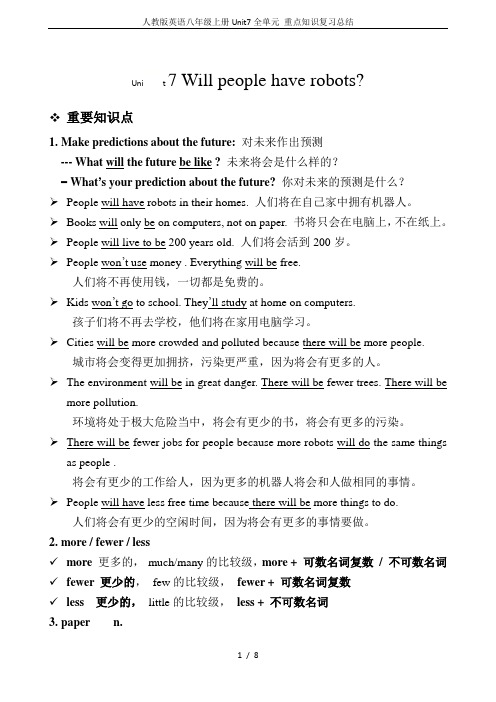
Uni t 7 Will people have robots?❖重要知识点1.Make predictions about the future: 对未来作出预测--- What will the future be like ? 未来将会是什么样的?= What’s your prediction about the future? 你对未来的预测是什么?➢People will have robots in their homes. 人们将在自己家中拥有机器人。
➢Books will only be on computers, not on paper. 书将只会在电脑上,不在纸上。
➢People will live to be 200 years old. 人们将会活到200岁。
➢People won’t use money . Everything will be free.人们将不再使用钱,一切都是免费的。
➢Kids won’t go to school. They’ll study at home on computers.孩子们将不再去学校,他们将在家用电脑学习。
➢Cities will be more crowded and polluted because there will be more people.城市将会变得更加拥挤,污染更严重,因为将会有更多的人。
➢The environment will be in great danger. There will be fewer trees. There will be more pollution.环境将处于极大危险当中,将会有更少的书,将会有更多的污染。
➢There will be fewer jobs for people because more robots will do the same things as people .将会有更少的工作给人,因为更多的机器人将会和人做相同的事情。
